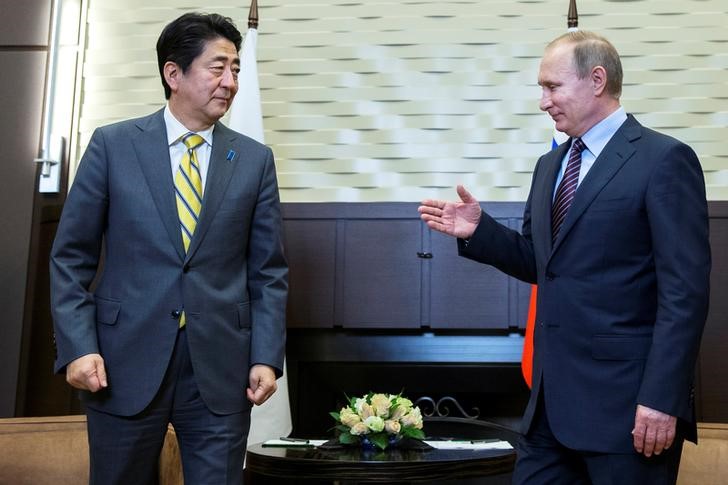By Kiyoshi Takenaka
TOKYO (Reuters) - Japan is hoping the lure of deeper economic ties with Russia will strengthen strategic relations in the face of a rising China, but sceptics question whether the approach will generate a breakthrough in a decades-old territorial dispute.
Japanese Prime Minister Shinzo Abe will meet Russian President Vladimir Putin on the sidelines of a business conference in Vladivostok to discuss, among other things, closer economic cooperation in such areas as energy and technology.
The meeting at the two-day forum in the Russian port city, which begins on Friday, will be followed by Putin's visit to Japan in December, a Russian official has said. It will be Putin's first visit since Abe took office in December 2012, although Abe has been to Russia several times.
Japan has been eyeing closer ties with Russia to counter China's growing clout, as well as its interest in Russia's natural resources. In a sign of the focus on economic ties, Abe has given his trade minister Hiroshige Seko an additional portfolio in charge of economic cooperation with Russia, the main government spokesman in Tokyo said on Thursday.
Earlier attempts to schedule a visit by Putin were derailed by Russia's 2014 annexation of Ukraine's Crimea region, which prompted Tokyo to join the United States and other Western countries in imposing sanctions on Moscow.
Former lawmaker Muneo Suzuki said broadening economic ties with an eye to the eventual resolution of the territorial row over islands in the western Pacific made sense because Russia's energy resources and Japan's technological expertise and investments were a good fit.
"What President Putin is hoping for is Japan's technology. If Japan's technology is sought after for the development of Russia's Far East, we should make it available," said Suzuki, who has advised Japanese prime ministers on Russian relations.
"As for Japan, we are importing oil and gas from the Middle East, which is some 10,000 km away. It would be in our national interest to procure them stably from Vladivostok or Sakhalin, which are just a stone's throw away," Suzuki told Reuters.
CONCESSION "UNTHINKABLE"
Japan claims sovereignty over a string of Russia-controlled western Pacific islands, called the Northern Territories in Japan and Southern Kuriles in Russia.
The row over the island chain, seized by troops of the former Soviet Union at the end of World War Two, has prevented a formal peace treaty between the two countries.
Critics say it is unlikely that economic cooperation would prompt Putin to hand over what Moscow regards as its own territory. Putin enjoys high approval ratings after the Crimea annexation despite Russia's economic difficulties.
"The Crimea annexation painted him as a great leader who took back territory that was once lost, and triggered an upturn in his support rating," said Shigeki Hakamada, professor emeritus at Japan's Aoyama Gakuin University.
"It is rather unthinkable that Putin makes a concession on what he himself said became Russian territory as a result of World War Two," he said.
Increased infrastructure investments on the disputed islands signal a clear reluctance on Russia's part to hand the islands over, James Brown, associate professor at Temple University's Japan campus, told reporters this week.
Hakamada said some promising comments could come from bilateral talks "to keep economic cooperation from Japan coming".

"But I don't think there will be a real concession," he said.